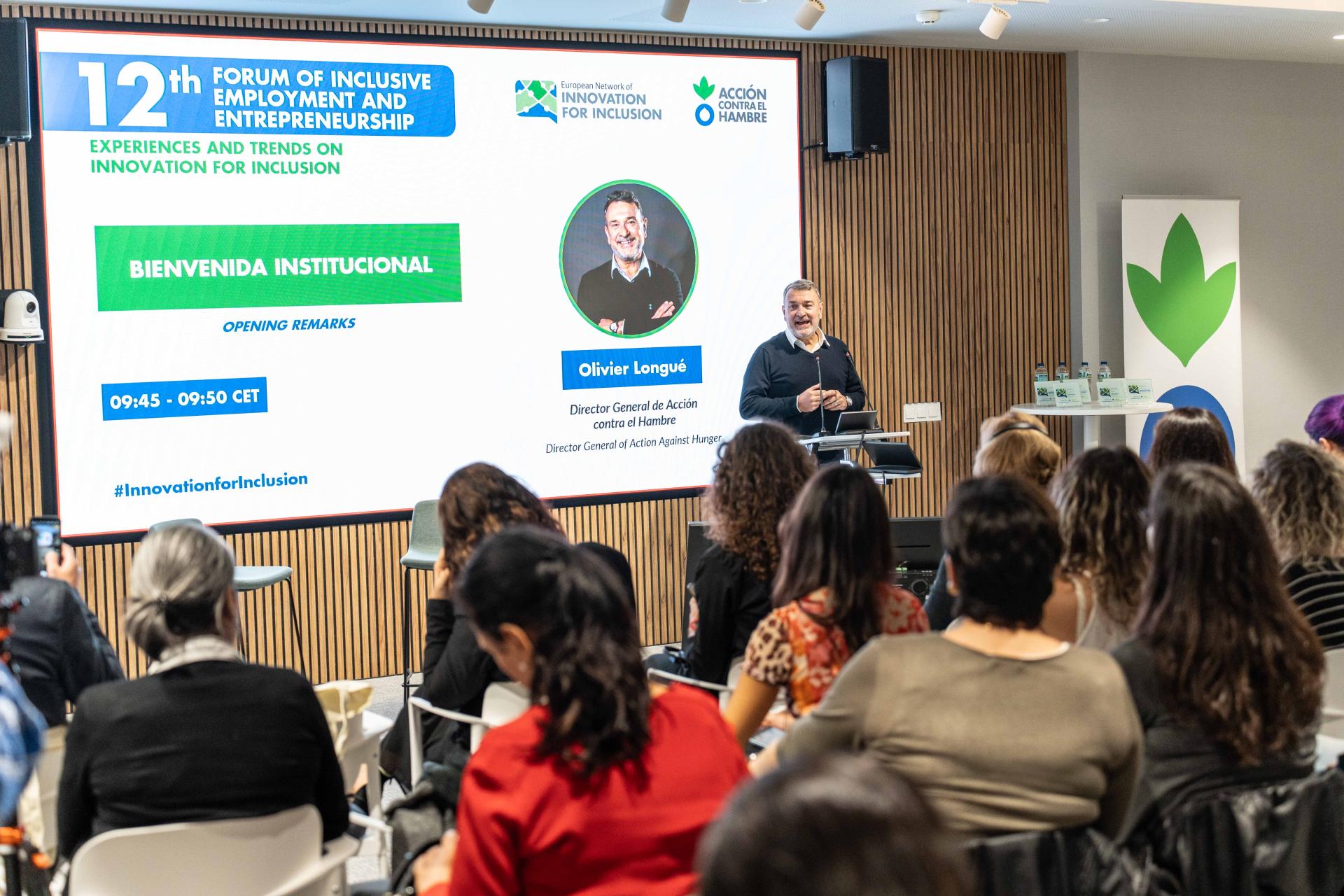
The European Network of Acción contra el Hambre advocates for social innovation approached collectively to achieve inclusion
- The 12th Forum on Inclusive Employment and Entrepreneurship, hosted by the European Network of Innovation for Inclusion, took place today at the auditorium of Acción contra el Hambre in Madrid. The event unveiled the latest social innovation trends emerging from Europe that are impacting Spain.
- Over a dozen national and European speakers, experts in social innovation, gathered with more than 200 attendees, both in-person and online, to share experiences, trends, and motivations for innovating in labor inclusion.
- The discussions centered around collaboration with other European entities and public institutions, community-focused project initiatives, the role of artificial intelligence, and the scaling of projects.
What path should a social innovation project follow to create social transformation? What tools are available to social entities for innovation? The 12th Forum on Employment and Entrepreneurship, held today by the European Network of Innovation for Inclusion, addressed these and other questions related to social innovation in Europe.
The main conclusion: social innovation is essential for achieving systemic change, but it must be implemented in a community-oriented and collaborative manner, leveraging new digital technologies and scaling through collective projects and synergies.
The event attracted over 200 participants, both in-person and via streaming, creating a vibrant environment for ideas, motivations, and collaborations among experts, organizations, companies, institutions, and social entities from across Europe. The forum explored how collective methodologies can drive real and sustainable change.
With an educational and participatory focus, the forum revealed key strategies for harnessing the potential of the European Social Fund Plus (ESF+) and artificial intelligence, highlighting pioneering projects that are redefining labor inclusion, such as the winners of the best practices award and innovative initiatives by Acción contra el Hambre: #StopMalnutrition and IAction.
During the opening remarks, Olivier Longué, Director General of Acción contra el Hambre, emphasized the forum's role as a foundation for collective reflection across various sectors and perspectives, expressing gratitude to the European Network of Innovation for Inclusion, the European Social Fund, and the Ministry of Social Rights, Consumption, and the 2030 Agenda. Luis González, Director of Technical Engineering and Social Action in Spain for Acción contra el Hambre, reiterated the purpose of the gathering: “To come together, learn, and promote collaboration among entities to build a stronger social innovation ecosystem and showcase the impact of this collaborative effort.”
The event also featured representatives from Spanish and European institutions involved in public social policies and social research. Ignacio Bolea, Deputy Director of Social Services at the Ministry of Social Rights, Consumption, and the 2030 Agenda, discussed opportunities for funding innovative projects in employability, entrepreneurship, and inclusion, such as the ESF+, underscoring “the challenges and opportunities that technological development presents for strengthening a new innovation ecosystem where local, economic, and institutional administrations work together.”
A central theme of the 12th Forum was the importance of a collaborative approach to social innovation. Experts in the field, including Itziar Moreno, Co-Director of the Agirre Lehendakaria Center for Social and Political Studies in Biscay, and Karel Herman Haegeman, Project Manager at the European Commission's Joint Research Centre in Seville, explained how solutions to social problems emerge from deep analysis and active listening within communities.
Both speakers presented tools and methodologies to promote co-creation and networking, encouraging attending organizations to adopt this approach. They shared publications and manuals to guide organizations in involving communities in innovation projects, calling for effective co-design.
The impact of artificial intelligence was another focal point of the event. Nerea Luis Mingueza, an AI consultant, discussed the opportunities these technologies present for enhancing the labor inclusion of vulnerable groups. Through data analysis tools and learning platforms, it’s possible to identify job opportunities and equip individuals with specific skills, although it’s essential to consider the implications and challenges of using AI in building more inclusive and resilient communities.
Finally, discussions delved into the challenge of scaling social innovations following a spiral pattern that, if successfully executed, can lead to systemic social change. Madeleine Clarke, founder and former executive director of Genio in Ireland, stated, “With scalability, our aim is to enlarge efforts. There are many challenges depending on where you are in the journey, the path you take, and where you want to end up, but funding remains the greatest challenge.”
Alicia García-Madrid, project manager for European initiatives at Acción contra el Hambre and promoter of the European Network of Innovation for Inclusion, highlighted the importance of scaling projects in collaboration with other European entities, which enhances the impact of social interventions. García-Madrid presented the network’s new focus on scaling innovations and offering a space for experimentation and training.
Miquel de Paladella, CEO of Upsocial, concluded the day by stating, “This is a great moment for innovation. The demand for innovation is increasingly explicit, and resources are available, so the time to innovate is now.”
Winners of the Best Practices Awards
As in previous years, the European Network of Innovation for Inclusion used the event to announce and celebrate the winners of the Call for Good Practices. In this knowledge exchange space for partnerships and scaling innovative practices, the following projects were recognized:
Best Practices in Inclusive Entrepreneurship:
- Winner: the intercultural women’s entrepreneurship incubator #SheDIDIT (Antwerp, Belgium)
- Finalist: the Ronsel Foundation for its Merlo program for returning Galician individuals
- Finalist: the non-profit sociocultural organization DRAMBLYS (Social Creativity Lab) for the initiative Relight
Best Practices in Labor Inclusion:
- Winner: Social Cooperative Lazzarelle, an Italian cooperative selling artisanal coffee made by incarcerated women (Naples, Italy)
- Finalist: Odyssea for its Refugee Women Academy initiative
- Finalist: the European Youth Energy Network for its online platform Energy Transition Careers Compass (ETCC)
For more information on the full program of the 12th Forum on Inclusive Employment and Entrepreneurship, click here, and to view the complete streaming, click here.